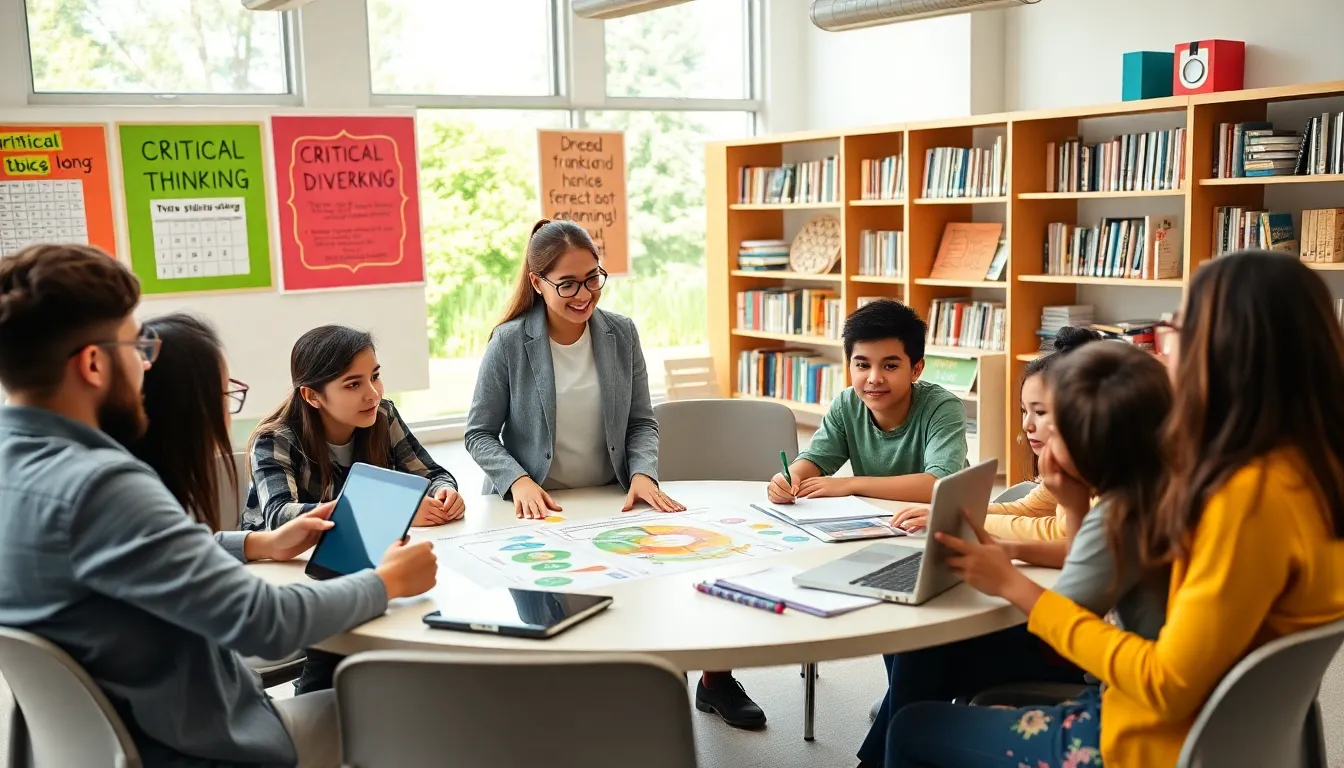In a world where traditional classrooms sometimes feel like a scene from a bad sitcom, it’s time to explore learning alternatives that actually spark joy. Forget the dusty textbooks and rigid schedules; innovative educational methods are popping up like mushrooms after a rainstorm. From online courses that let you learn in your pajamas to immersive experiences that make textbooks feel like ancient relics, the options are endless.
Imagine mastering a new skill while sipping your favorite coffee or diving into a hands-on workshop that feels more like a party than a lecture. These alternatives not only make learning more enjoyable but also cater to diverse lifestyles and preferences. So why settle for the same old grind when a world of exciting, effective learning opportunities awaits? Let’s dive into the fascinating realm of learning alternatives that could change the way knowledge is gained forever.
Table of Contents
ToggleOverview of Learning Alternatives
Innovative learning alternatives offer diverse methods to enhance education, moving beyond traditional classroom settings. Online courses provide flexibility, allowing learners to access materials anytime and anywhere. Immersive experiences, such as workshops and field trips, engage students in practical applications of knowledge.
Blended learning combines online education with in-person interactions, addressing various learning styles. Peer-led study groups foster collaboration and support among students. Experiential learning focuses on hands-on activities, equipping learners with real-world skills.
Alternative assessments, such as portfolios and presentations, emphasize competencies over standardized tests. Competency-based education allows students to progress based on their mastery of subjects. Microlearning breaks down information into small segments, making content more manageable.
Varied environments, including nature-based learning, promote creativity and critical thinking. In-person coding boot camps offer accelerated learning and skill development in tech fields. Community education programs provide opportunities for lifelong learning in local contexts.
Training in workspaces enables learners to gain experience in authentic settings. Gamification incorporates game elements into lessons, increasing motivation and engagement. Online workshops offer specialized expertise and skills necessary for specific careers.
Each method caters to different preferences, ensuring that educational opportunities are wide-ranging. Young learners benefit from interactive and personalized approaches, while adult learners may prioritize convenience and relevance. Exploring these innovative methods transforms educational experiences for all.
Types of Learning Alternatives

Alternative learning methods offer various approaches to education beyond traditional classrooms. These options enhance engagement and provide flexibility tailored to different learners.
Online Learning Platforms
Online learning platforms provide access to a vast array of courses. They allow individuals to learn at their own pace from anywhere with an internet connection. Platforms like Coursera and Udemy offer professional development, skill-based training, and personal interests. These platforms often feature interactive elements such as quizzes and discussion forums, enhancing the learning experience. Flexibility in scheduling meets diverse lifestyles, accommodating busy professionals and students alike.
Traditional Classroom Alternatives
Traditional classroom alternatives include various effective options that engage students in innovative ways. Workshops provide hands-on experiences, often incorporating real-world scenarios. Field trips extend learning beyond the classroom into practical applications, making subjects come alive. Cooperative learning environments foster collaboration among peers, encouraging teamwork and communication. Homeschooling offers customizable education tailored to individual needs, combining resources and curricula that suit each student’s learning style. These alternatives cater to diverse preferences, promoting more personalized educational experiences.
Benefits of Learning Alternatives
Learning alternatives provide numerous advantages that enhance educational experiences. They offer innovative paths that suit diverse needs and lifestyles.
Flexibility and Accessibility
Online courses exemplify flexibility by allowing learners to study at their convenience. Schedules can adapt to personal commitments, enabling participants to pursue education without geographical constraints. Many platforms offer courses accessible from any device, facilitating easy learning from home or on the go. This adaptability attracts a wide audience, including working professionals, parents, and individuals with varying obligations.
Personalized Learning Experiences
Customized learning experiences cater to unique preferences and learning styles. Workshops and peer-led study groups foster collaborative environments, enhancing understanding and retention of material. Educational alternatives prioritize the needs of individual learners, offering tailored pathways that resonate with specific interests. Moreover, programs like competency-based education emphasize mastery, allowing students to progress at their own pace. This personalized approach not only nurtures passion but also boosts engagement and motivation among learners.
Challenges Facing Learning Alternatives
Learning alternatives face several significant challenges. Addressing these issues is crucial for maximizing the potential of modern educational methods.
Technology Barriers
Access to reliable technology poses a significant challenge. Many learners struggle with inadequate internet connections or lack necessary devices. In urban areas, this issue may appear less pronounced, but rural learners often face considerable obstacles. Complex platforms can further intimidate users unfamiliar with technology. Understanding how to navigate online courses matters for student success. Institutions must prioritize user-friendly design and support services to help learners adapt effectively.
Quality and Accreditation Concerns
Quality control in learning alternatives presents another hurdle. With an influx of online courses, distinguishing reputable providers from subpar ones can be tricky. Accreditation plays a key role in ensuring educational integrity. Employers often require credentials from recognized programs, affecting the employability of learners. Additionally, variances in course quality can undermine student confidence in alternative methods. Establishing clear accreditation standards benefits both providers and learners, promoting trust and accountability in alternative education systems.
Exploring innovative learning alternatives opens up a world of possibilities for students of all ages. These methods not only enhance engagement but also cater to individual learning preferences. As education continues to evolve, embracing flexibility and accessibility becomes crucial in fostering a love for learning.
While challenges like technology barriers and accreditation concerns exist, the benefits of personalized educational experiences far outweigh them. By prioritizing creativity critical thinking and real-world skills, alternative learning options pave the way for a more enriching educational journey. Adapting to these changes can empower learners to thrive in an ever-changing world.



